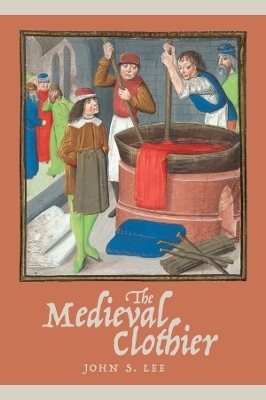
The Medieval Clothier
Seiten
2023
Boydell & Brewer (Verlag)
978-1-83765-109-2 (ISBN)
Boydell & Brewer (Verlag)
978-1-83765-109-2 (ISBN)
A clear and accessibly written guide to the medieval cloth-making trade in England.
Cloth-making became England's leading industry in the late Middle Ages; clothiers co-ordinated its different stages, in some cases carrying out the processes themselves, and found markets for their finished cloth, selling to merchants, drapers and other traders. While many clothiers were of only modest status or "jacks of all trades", a handful of individuals amassed huge fortunes through the trade, becoming the multi-millionaires of their day.
This book offers the first recent survey of this hugely important and significant trade and its practitioners, examining the whole range of clothiers across different areas of England, and exploring their impact within the industry andin their wider communities. Alongside the mechanics of the trade, it considers clothiers as entrepreneurs and early capitalists, employing workers and even establishing early factories; it also looks at their family backgrounds and their roles as patrons of church rebuilding and charitable activities. It is completed with extracts from clothiers' wills and a gazetteer of places to visit, making the book invaluable to academics, students, and local historians alike.
Cloth-making became England's leading industry in the late Middle Ages; clothiers co-ordinated its different stages, in some cases carrying out the processes themselves, and found markets for their finished cloth, selling to merchants, drapers and other traders. While many clothiers were of only modest status or "jacks of all trades", a handful of individuals amassed huge fortunes through the trade, becoming the multi-millionaires of their day.
This book offers the first recent survey of this hugely important and significant trade and its practitioners, examining the whole range of clothiers across different areas of England, and exploring their impact within the industry andin their wider communities. Alongside the mechanics of the trade, it considers clothiers as entrepreneurs and early capitalists, employing workers and even establishing early factories; it also looks at their family backgrounds and their roles as patrons of church rebuilding and charitable activities. It is completed with extracts from clothiers' wills and a gazetteer of places to visit, making the book invaluable to academics, students, and local historians alike.
Introduction
Making cloth
Marketing cloth
Identifying Clothiers
Clothiers and government
Clothiers in society
Famous clothiers
Conclusion
Appendix 1: Cloths taxed by county
Appendix 2: Cloths taxed by locality
Appendix 3: Cloth types, as defined by statute in 1552
Appendix 4: Will of Thomas Paycocke of Coggeshall
Appendix 5: Will of Thomas Spring III of Lavenham
Appendix 6: Will of John Smallwood the elder alias John Winchecombe I of Newbury
Appendix 7: Will of William Stumpe of Malmesbury
Gazetteer of surviving buildings
Glossary
Bibliography
| Erscheinungsdatum | 10.10.2023 |
|---|---|
| Reihe/Serie | Working in the Middle Ages |
| Zusatzinfo | 10 colour, 20 b/w, 6 line illus. |
| Verlagsort | Woodbridge |
| Sprache | englisch |
| Maße | 156 x 234 mm |
| Gewicht | 697 g |
| Themenwelt | Kunst / Musik / Theater ► Design / Innenarchitektur / Mode |
| Geschichte ► Allgemeine Geschichte ► Mittelalter | |
| Geisteswissenschaften ► Geschichte ► Regional- / Ländergeschichte | |
| Geschichte ► Teilgebiete der Geschichte ► Kulturgeschichte | |
| Technik | |
| ISBN-10 | 1-83765-109-4 / 1837651094 |
| ISBN-13 | 978-1-83765-109-2 / 9781837651092 |
| Zustand | Neuware |
| Haben Sie eine Frage zum Produkt? |
Mehr entdecken
aus dem Bereich
aus dem Bereich
eine neue Geschichte des Mittelalters
Buch | Hardcover (2023)
C.H.Beck (Verlag)
38,00 €


